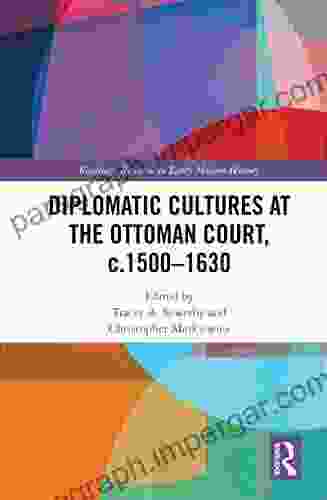Diplomatic Cultures at the Ottoman Court, 1500-1630: Diplomacy in the Early Modern World

The Ottoman Empire was one of the most powerful and influential empires in the world during the early modern period. Its vast territory stretched from the Balkans to the Middle East, and it had diplomatic relations with a wide range of European powers. The Ottoman court was a center of diplomatic activity, and its diplomatic practices and protocols were highly developed.
5 out of 5
| Language | : | English |
| File size | : | 3921 KB |
| Text-to-Speech | : | Enabled |
| Enhanced typesetting | : | Enabled |
| Print length | : | 407 pages |
This book explores the diplomatic cultures of the Ottoman court during the 16th and 17th centuries. It provides a comprehensive overview of the practices, protocols, and rituals that shaped diplomatic interactions between the Ottoman Empire and its European counterparts. The book draws on a wide range of sources, including Ottoman and European diplomatic archives, travel accounts, and contemporary histories.
The Organization of the Ottoman Diplomatic Service
The Ottoman diplomatic service was highly organized and efficient. It was headed by the Reis Efendi, who was the chief foreign minister of the empire. The Reis Efendi was responsible for managing relations with foreign powers, and he had a staff of secretaries and interpreters to assist him.
The Ottoman diplomatic service was divided into two main branches: the central chancery and the provincial chanceries. The central chancery was located in Istanbul, and it was responsible for managing relations with the major European powers. The provincial chanceries were located in the provinces, and they were responsible for managing relations with the smaller European states.
Diplomatic Protocols and Rituals
The Ottoman court had a complex set of diplomatic protocols and rituals that governed the conduct of diplomatic interactions. These protocols and rituals were designed to maintain the prestige of the Ottoman Empire and to ensure that foreign diplomats were treated with respect.
One of the most important diplomatic protocols was the requirement that foreign diplomats present their credentials to the sultan in person. This ceremony was known as the "audience ceremony," and it was a highly formalized event. Diplomats were required to follow a strict dress code, and they had to present their credentials in a specific manner.
Another important diplomatic protocol was the requirement that foreign diplomats reside in designated quarters in Istanbul. These quarters were known as the "elçi hanesi," and they were located in the Galata district of the city. Diplomats were required to remain in the elçi hanesi until they were granted an audience with the sultan.
Diplomatic Gifts
The exchange of gifts was an important part of Ottoman diplomatic culture. Gifts were used to express friendship, goodwill, and respect. The most common gifts were precious objects, such as jewelry, textiles, and weapons.
The Ottoman court had a special protocol for the exchange of gifts. Gifts were presented to the sultan in a specific manner, and they were always accompanied by a letter from the sender. The sultan would then respond with a gift of his own.
The Role of Interpreters
Interpreters played a vital role in Ottoman diplomatic interactions. They were responsible for translating diplomatic correspondence and for facilitating communication between Ottoman officials and foreign diplomats.
The Ottoman court employed a large number of interpreters. These interpreters were typically multilingual, and they were trained in the diplomatic protocols and rituals of the court.
Diplomatic Relations between the Ottoman Empire and Europe
The Ottoman Empire had diplomatic relations with a wide range of European powers, including the Holy Roman Empire, France, England, and Russia. These relations were often complex and fraught with tension.
One of the most important factors in Ottoman-European relations was the issue of religion. The Ottoman Empire was a Muslim state, and its European counterparts were Christian states. This difference in religion often led to conflict and misunderstanding.
Another important factor in Ottoman-European relations was the issue of trade. The Ottoman Empire controlled a vast trading network that stretched from the Middle East to Europe. European powers were eager to gain access to this network, and they often competed with each other for Ottoman trade privileges.
Despite the challenges, the Ottoman Empire and Europe managed to maintain diplomatic relations for centuries. These relations were essential for the exchange of goods and ideas, and they helped to prevent the outbreak of war.
The Ottoman Empire was a major player in the early modern world. Its diplomatic practices and protocols were highly developed, and they played a vital role in shaping relations between the Ottoman Empire and Europe. This book provides a comprehensive overview of the diplomatic cultures of the Ottoman court, and it is an essential resource for anyone interested in the history of diplomacy and international relations.
5 out of 5
| Language | : | English |
| File size | : | 3921 KB |
| Text-to-Speech | : | Enabled |
| Enhanced typesetting | : | Enabled |
| Print length | : | 407 pages |
Do you want to contribute by writing guest posts on this blog?
Please contact us and send us a resume of previous articles that you have written.
 Book
Book Novel
Novel Page
Page Chapter
Chapter Text
Text Story
Story Genre
Genre Reader
Reader Library
Library Paperback
Paperback E-book
E-book Magazine
Magazine Newspaper
Newspaper Paragraph
Paragraph Sentence
Sentence Bookmark
Bookmark Shelf
Shelf Glossary
Glossary Bibliography
Bibliography Foreword
Foreword Preface
Preface Synopsis
Synopsis Annotation
Annotation Footnote
Footnote Manuscript
Manuscript Scroll
Scroll Codex
Codex Tome
Tome Bestseller
Bestseller Classics
Classics Library card
Library card Narrative
Narrative Biography
Biography Autobiography
Autobiography Memoir
Memoir Reference
Reference Encyclopedia
Encyclopedia Joe Ryder
Joe Ryder Joe Forno Jr
Joe Forno Jr Jennifer Wright
Jennifer Wright Joel Levy
Joel Levy Jenny Diski
Jenny Diski Jill S Tietjen
Jill S Tietjen Jim Kartalamakis
Jim Kartalamakis Jeffery Combs
Jeffery Combs Jena Pincott
Jena Pincott Jianrong Wu
Jianrong Wu John Boyle
John Boyle Jennifer Powers
Jennifer Powers Jobe David Leonard
Jobe David Leonard Jennifer Fletcher
Jennifer Fletcher Jim Hancock
Jim Hancock Jess Goodell
Jess Goodell John A Neuenschwander
John A Neuenschwander Joe Ruzvidzo
Joe Ruzvidzo Jim Davis
Jim Davis John Bradshaw
John Bradshaw
Light bulbAdvertise smarter! Our strategic ad space ensures maximum exposure. Reserve your spot today!

 Randy HayesFire Detection and Protection Systems: A Comprehensive Guide for Fire Safety...
Randy HayesFire Detection and Protection Systems: A Comprehensive Guide for Fire Safety...
 Chadwick PowellSports Law in Denmark: A Comprehensive Guide for Danish and International...
Chadwick PowellSports Law in Denmark: A Comprehensive Guide for Danish and International... Benji PowellFollow ·19.4k
Benji PowellFollow ·19.4k Mark TwainFollow ·8.8k
Mark TwainFollow ·8.8k Galen PowellFollow ·16.8k
Galen PowellFollow ·16.8k Hassan CoxFollow ·3.5k
Hassan CoxFollow ·3.5k Ashton ReedFollow ·14.8k
Ashton ReedFollow ·14.8k Dalton FosterFollow ·10.6k
Dalton FosterFollow ·10.6k Tyler NelsonFollow ·4.3k
Tyler NelsonFollow ·4.3k Jimmy ButlerFollow ·8.3k
Jimmy ButlerFollow ·8.3k

 Christian Barnes
Christian BarnesUnleash Your Creativity: Build Interlocking 3D Animal and...
Discover the Art of Paper...

 Terry Bell
Terry BellUnveiling the Secrets of Winning: A Comprehensive Guide...
In the realm of chance and fortune, the...

 Albert Camus
Albert Camus101 Things That You Should Do Before Leaving The House In...
Starting your day right is...

 Anthony Burgess
Anthony BurgessForcing Move 2024 Volume: Unleash Your Inner Grandmaster
Embark on an extraordinary chess...
5 out of 5
| Language | : | English |
| File size | : | 3921 KB |
| Text-to-Speech | : | Enabled |
| Enhanced typesetting | : | Enabled |
| Print length | : | 407 pages |












